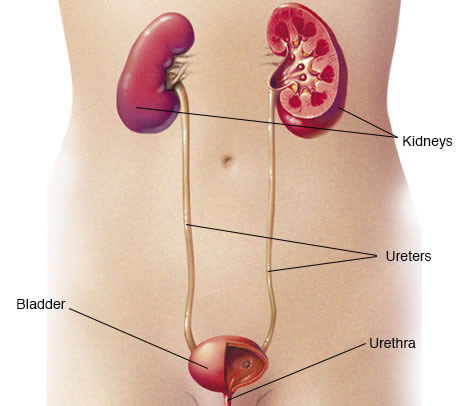Why Does Kidney Infection Cause Fatigue?
Kidney infection can lead to some serious complications if left untreated. It should be treated immediately before the infection spreads and becomes advanced. The symptoms include changes in urine, pain in particular areas of the body, and other discomforts. Interestingly, it can also lead to feeling very tired. Although this issue is not fully known, there are some explanations of why it causes fatigue.
 Many times, it occurs when bacteria enter the opening of tube (urethra) that carries urine from the bladder. They can multiply and move upward. First, the bladder gets infected and then the kidneys. Many times, these bacteria are a type called E. coli.
Many times, it occurs when bacteria enter the opening of tube (urethra) that carries urine from the bladder. They can multiply and move upward. First, the bladder gets infected and then the kidneys. Many times, these bacteria are a type called E. coli.
Bacteria can get into the urinary tract in several different ways. But they usually spread from anus to urethra. For instance, bacteria can enter into urethra if we wipe our bottom and the soiled toilet paper accidentally touches the genitals.
The kidneys are important to help keep normal, healthy-balanced blood. They are responsible of what to keep and what to remove in the blood. And therefore, any bad things in the blood may also affect your kidneys.
In less common cases, fungi or bacteria can spread to the kidneys through bloodstream. Many infections in other parts of the body can go into the bloodstream. And kidney infection can occur through this route, though it’s unusual.
For instances, bacteria that infect the skin can spread to the bloodstream which then may eventually go to the kidneys. In rare cases, the infection occurs after a kidney surgery. The use of artificial heart valve or joint may also increase the risk of infection.

*Image credit to Mayo
Furthermore, the problem can also be attributed by a number of different factors. Generally, the risk of getting kidney infection is high in people with:
Infection in another organ of urinary system
The kidneys are part of your urinary system. If another organ in the urinary system gets infected, there is a chance for the infection to spread to the kidneys. For instance, a condition called prostatitis (an infection in the prostate gland) can spread to the kidneys
Urinary tract obstruction
Any conditions that obstruct or slow the flow of urine can contribute to cause infection in the urinary tract, including in the kidneys. These include enlarged prostate (in men), kidney stones, injury in the spinal cord, or other abnormalities in the urinary tract.
The urinary tract obstruction makes it more difficult to fully empty your bladder when urinating. And over time this will set a good environment for bacteria to grow and cause infection.
Gender
It is more common in women, because female urinary system has urethra that is much shorter and closer to the anus. And therefore bacteria can get into the opening of urethra more easily. Nevertheless, kidney infection can also affect men.
Decreased immune system
The body immune system plays a key role to fight against foreign invaders, such as bad bacteria or viruses. And your body is easier to get infected if you have weakened immune system.
There are a number of factors and causes that impair the body immune system. These include HIV, diabetes, and other autoimmune disorders. Some medications may also have a similar effect, such as chemotherapy and medications to prevent rejection in transplanted organ.
If you use a urinary catheter
There are numerous conditions that can affect your urinary system. Some may make you need to use urinary catheter, a tube used to help drain your urine. Prolonged use of this tube may put you at high risk of infection in the urinary tract.
What else?
- Problem in the nerves around the bladder. You’re likely to become unaware when having infection in the bladder if nerves around your bladder don’t work as well as they should. And again, the infection in the bladder can spread to the kidneys.
- Sometime pregnancy is another cause. Pregnancy can lead to physical changes which some may slow the flow of urine out of the bladder.
- Vesicoureteral reflux, a condition that make small amounts of urine move upward from the bladder to the kidneys through ureters (tubes that line from the kidneys to the bladder). People with this disorder may develop frequent kidney infection in their childhood. The risk of infection may continue in their adulthood.
Typically, the infection causes painful urination (with burning sensation when you pee). This discomfort may also be followed with other symptoms such as:
- Changes in urination such as frequent urination, feeling of unable to urinate fully, or persistent-strong urge to urinate. You may also have cloudy, bad-smell urine.
- Pain in the lower back, side (flank area), groin, or around genital area. Sometime, the infection may cause abdominal pain, too.
- Feeling sick or/and high fever, up to 103.1 Fahrenheit (39.5 Celsius).
- Fatigue (tiredness).
- Decreased appetite.
- Change in bowel movement, especially such as diarrhea.
- Or even blood found in the urine (hematuria).
With quick and appropriate treatment, it should be harmless and doesn’t pose to other health risks, though it often makes patient feel very unwell. If the infection is left untreated, it can be potential to cause serious complications such as:
- The risk of kidney damage, leading to chronic kidney disease.
- The infection may spread to blood circulation, causing septicemia (blood poisoning). Again, the kidneys play a role to remove bad things and keep necessary things from the bloodstream. If they get infected, there is a chance for the bacteria to spread in the blood.
- If the infection occurs during pregnancy, this may cause pregnancy complications such as delivering babies with low birth weight.
Fatigue is usually characterized by feeling of exhaustion, tiredness, or lack of energy. It is a symptom, not a disease. And it is a common symptom – even if you are a healthy individual, you can have it, too. For instances, you often feel mildly fatigued due to poor sleep, anxiety, overwork, lack of exercise, or boredom.
But if it comes with unknown reasons, there may be something going wrong. In fact, there are a number of different medical conditions linked to fatigue.
Some patients with kidney infection report that they have feeling very tired. Even the symptom may continue after treatment. But in general, it should improve as the infection clears up.
The following are a number of possible reasons of why and how kidney infection can cause fatigue:



